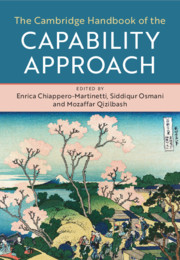Book contents
- The Cambridge Handbook of the Capability Approach
- The Cambridge Handbook of the Capability Approach
- Copyright page
- Dedication
- Contents
- Figures
- Tables
- Contributors
- Foreword
- Acknowledgements
- General Introduction
- Part I Historical Antecedents and Philosophical Debates
- Introduction to Part I
- 1 The Capabilities Approach and the History of Philosophy
- 2 Karl Marx and the Capabilities Approach
- 3 Utility and Capability
- 4 Intellectual History and Defending the Capabilities Approach
- 5 Sen, Smith and the Cambridge Tradition
- 6 The Capability Approach to Well-Being and Freedom from the Viewpoint of Welfare Economics and Social Choice Theory
- 7 Resources or Capabilities?
- 8 Taking Multidimensionality Seriously
- 9 The Capabilities Approach and Political Liberalism
- 10 Selecting a List
- 11 Individualism and the Capability Approach
- 12 The Politics of Wonder
- Part II Methods, Measurement and Empirical Evidence
- Part III Issues in Public Policy
- Index
- References
8 - Taking Multidimensionality Seriously
Capabilities, Rawls’s Primary Goods and Guiding Action
from Part I - Historical Antecedents and Philosophical Debates
Published online by Cambridge University Press: 11 November 2020
- The Cambridge Handbook of the Capability Approach
- The Cambridge Handbook of the Capability Approach
- Copyright page
- Dedication
- Contents
- Figures
- Tables
- Contributors
- Foreword
- Acknowledgements
- General Introduction
- Part I Historical Antecedents and Philosophical Debates
- Introduction to Part I
- 1 The Capabilities Approach and the History of Philosophy
- 2 Karl Marx and the Capabilities Approach
- 3 Utility and Capability
- 4 Intellectual History and Defending the Capabilities Approach
- 5 Sen, Smith and the Cambridge Tradition
- 6 The Capability Approach to Well-Being and Freedom from the Viewpoint of Welfare Economics and Social Choice Theory
- 7 Resources or Capabilities?
- 8 Taking Multidimensionality Seriously
- 9 The Capabilities Approach and Political Liberalism
- 10 Selecting a List
- 11 Individualism and the Capability Approach
- 12 The Politics of Wonder
- Part II Methods, Measurement and Empirical Evidence
- Part III Issues in Public Policy
- Index
- References
Summary
This essay seeks to get beyond the narrow debate between two candidate grounds for indexing advantage in accounts of justice: the Rawlsian primary goods of income and wealth and capability or capabilities. Rawls is more deeply committed to multidimensionality than this debate has tended to recognize. Commitment to multidimensionality is shallow if each of the multiple dimensions is seen as contributory to something sought only for its own sake that can be adequately represented along a single dimension, such as welfare or well-being as they are sometimes conceived. To avoid treating multidimensionality shallowly — whether within the domain of justice or outside it — defenders of appealing to capabilities would do well to follow Rawls in recognizing a division of moral labour among multiple principles, with the different principles serving different social values and addressing different sets of social institutions. This approach offers an attractive and flexible alternative to single-principle outcome-ranking approaches. Along the way, in reference to the older debates, it is shown that there is, for Rawls, no single currency of justice and that he has serious reasons, grounded in respect for the fact of pluralism, to avoid resting too much theoretical weight on the idea of well-being.
Keywords
- Type
- Chapter
- Information
- The Cambridge Handbook of the Capability Approach , pp. 146 - 164Publisher: Cambridge University PressPrint publication year: 2020

